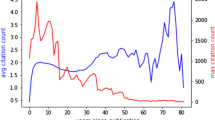Abstract
The issue of plagiarism—claiming credit for work that is not one’s own, rightly, continues to cause concern in the academic community. An analysis is presented that shows the effects that may arise from metrics-based assessments of research, when credit for an author’s outputs (chiefly publications) is given to an institution that did not support the research but which subsequently employs the author. The incentives for what is termed here “institutional plagiarism” are demonstrated with reference to the UK Research Assessment Exercise in which submitting units of assessment are shown in some instances to derive around twice the credit for papers produced elsewhere by new recruits, compared to papers produced ‘in-house’.

Similar content being viewed by others
References
Alfredo, K., & Hart, H. (2011). The University and the responsible conduct of research: Who is responsible for what? Science and Engineering Ethics, 17(3), 447–457. doi:10.1007/s11948-010-9217-3.
Loadsman, J. (2009). Plagiarism: Transparency required. [Comment Letter]. Science, 325(5942), 813. doi:10.1126/science.325_813b.
Roberts, G. (2003). Review of research assessment: Report by Sir Gareth Roberts to the UK funding bodies. http://www.ra-review.ac.uk/reports/roberts.asp.
Roig, M. (2009). Plagiarism: Consider the context. [Comment Letter]. Science, 325(5942), 813–814. doi:10.1126/science.325_813c.
The insider’s guide to plagiarism (2009). [Editorial]. Nature Medicine, 15(7), 707. doi:10.1038/nm0709-707.
Author information
Authors and Affiliations
Corresponding author
Rights and permissions
About this article
Cite this article
Berry, C. Metrics-Based Assessments of Research: Incentives for ‘Institutional Plagiarism’?. Sci Eng Ethics 19, 337–340 (2013). https://doi.org/10.1007/s11948-012-9352-0
Received:
Accepted:
Published:
Issue Date:
DOI: https://doi.org/10.1007/s11948-012-9352-0




